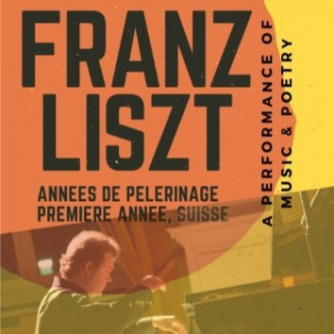Details
1901 Arts Club
7 Exton Street
Waterloo
London
SE1 8UE
England
Programme
Franz Liszt – Années de pèlerinage II 'Italie', S.161
Desmond Clarke – Liszt Fields
Frederick Viner – Sonnetto
Robert Fokkens – Précis: On hearing a work by Liszt
Performers
Jakob Fichert – piano
Other concerts in this Series (+)
Programme Note
The second part of JAKOB FICHERT's project focussing on the first two volumes of Liszt’s Années de Pèlerinage (Years of Pilgrimage).
The title Années de Pèlerinage, Years of Pilgrimage, evokes many associations, and beyond the obvious religious connotation, these works transcend any faith and radiate a sense of a more generic inner journey. The creation of Liszt’s Years of Pilgrimage span across almost his whole adult life, and range from the youthful virtuoso to his late experimental style. His Album d’un Voyager, the predecessor of the first book, Première Année, Suisse, was conceived in the 1830’s, later revised and published shortly before the second book Deuxième Année, Italie in the mid 1850’s. Troisième Année, which is not attributed to a particular country, was written almost two decades later.
Deuxième Année, Italie, a cycle, which can be divided into three sections, is at the heart of this event. The first of these sections consisting of three pieces is mainly inspired by the fine arts. Sposalizio and Il Penseroso are a response to art works by Raphael and Michelangelo, and Canzonetta del Salvatore Rosa is based on a poem by Giovanni Bononcini, which was originally attributed to Salvator Rosa, a 17th century painter and writer of satirical poetry. The second section is composed of the three Petrarca Sonnets, an elegiac journey of love and desire. Sonnet 47, a poetic declaration of love is followed by Sonnet 104, which communicates emotional struggle and the feeling of being torn apart. The final Sonnet 123 is filled with transcendental beauty and otherworldliness. The monumental Apres une lecture de Dante (After Reading Dante): Sonata quasi Fantasia, more popularly known as the Dante Sonata, constitutes the final part of this cycle. Inspired by a poem of the same title by Victor Hugo, Liszt’s music programmatically describes the various stages in Dante’s Divine Comedy, from the wailing of the lost souls in hell to the joy of those in heaven.
I have commissioned three composers of highly differing styles and approaches to write commentaries on this masterpiece.

 Your events at Classical Events
Your events at Classical Events

